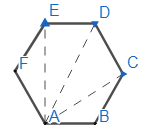Question
Question: If ABCDEF is a regular hexagon and if \(\overline{AB}+\overline{AC}+\overline{AD}+\overline{AE}+\ove...
If ABCDEF is a regular hexagon and if AB+AC+AD+AE+AF=λAD , then λ is:
(A). 0
(B). 1
(C). 2
(D). 3
Solution
Hint: We will be using the concepts of vector algebra. We will be using vector addition through triangle law of vector addition in which two vectors to be added is represented as the side of a triangle and resultant vector is the third side of the triangle.
Complete step-by-step solution -
We have been given a regular hexagon ABCDEF as

Now, we have been given that AB+AC+AD+AE+AF=λAD. And we have to find the value of λ.
Now we know that according to the triangle law of vector addition, when two vectors are represented as two sides of a triangle with the order and magnitude then the third side is the resultant vector.
Now, we consider ΔACD. We get,
AC+CD=AD …………………….. (1)
In ΔADE we get AE+ED=AD …………………. (2)
Now, we will add (1) and (2)
AC+CD+AE+ED=2AD……………….. (3)
Now, we know that ABCEDF is a regular hexagon, therefore, opposite sides are equal in magnitude and direction. Therefore,
AF=CD …………… (4)
ED=AB …………… (5)
Now we will substitute the value of CD and ED from (1) and (2) in (3) so that,
AC+AF+AE+AB=2AD .
Now, we will add AD on both sides. Therefore we have,
AB+AC+AD+AE+AF=3AD.
Now, we will compare this with
AB+AC+AD+AE+AF=λAD.
So, the value of λ is 3.
Hence, the correct option is (D).
Note: To solve these types of questions one must know the triangle law of vector addition also it has to be noted that we have AF=CD and ED=AD through geometry. Here we need to know about the concept of vectors to be parallel.
